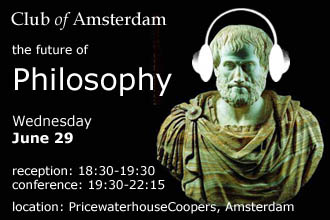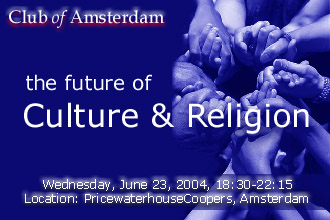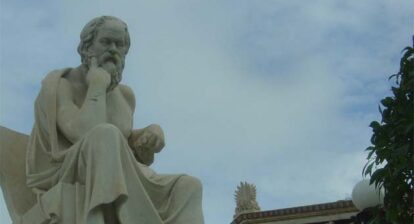Club of Amsterdam

Supporter
PricewaterhouseCoopers
|
Huib Schwab: |
|
|
|
|
In classical Socratic style John and Mathijs confront some central problems around tonight’s main subject. Philosophy as dialogue, as a dynamic process departing from given insights, developing towards acceptable truths. Thought itself is often more of a deceiver than a harbinger of truth. The inertia of many intellectual thought processes underlines the need for the critical disposition that is essential to philosophy. In order to think out of the box you have to know that you’re inside one, philosophy helps you determine whether this is so. Yet philosophy has allowed itself to be fragmented into specialized doctrines and withdrawn into the ivory tower of academic discourse. Philosophy can be of great value in its ability to transcend the domain of antagonism and specialism. Yet philosophy has frustrated its own application by cloaking its insights in obscure terminlogy and incomprehensible idiom. It can integrate different dimensions of knowledge by asking the fundamental questions, but in order to do that it must also connect itself to context and strive to be meaningful. It must make sense in a way that is obvious both for philosophers and layman alike. Every question that starts with ‘why’ is fundamentally a philosophical question, and with this simple precept we can all become philosopher whenever we wish. Philosophy should make sense and deserves to be taken seriously in a wider context than is currently believed. With an appropriate amount of wit and profundity the two philosophers aim to show that philosophy is action as much at it is thought. |
|
|
|
Questioning the value of philosophy is not new. In many cases, the debate about the role of philosophy has centered around the age old battle between philosophy and literature, wherein literature is considered to be the domain of direct, daily life experience and feeling, and philosophy that of pure reasoning. This battle continues to be fought in the realm of contemporary ethics, as in the works of Martha Nussbaum and Michael Cunningham, and has also been introduced in the field of medical ethics. For example, in the discussion concerning the legalization of euthanasia in The Netherlands, it has been argued that novels can give a greater insight in the complex and ambiguous way in which doctors and patients alike deal with questions concerning ‘artificial death’. The question, however, is what does a novel show us exactly? How can it relate to daily life experience and how can it help us making decisions that we consider to be the right decisions? A question above the rest, is whether we may make such a sharp division between philosophy and literature. Since the nineteenth century many philosophers have devoted much attention to literature, because both philosophy and literature, they argue, are concerned with the knowledge of concrete reality. One of the exponents of that opinion is Maurice Merleau-Ponty (1908-1961). According to Merleau-Ponty the task of the writer is no different from that of the philosopher: both are focused on the experience of the world, as it originates before the thinking about the world. Merleau-Ponty emphasizes that his philosophy is a method, which like literature expresses the pre-reflective experience, i.e. the experience on which all analyses are based. This method can help us not only determine the value of literature within ethical discussions, but also help us determine the value concerning the status, meaning and importance of abstract, strictly rationalistic reasoning within the realms of politics and science. |
19:30
Welcome by our Moderator ![]() Homme Heida, Promedia, Member of the Club of Amsterdam Round Table
Homme Heida, Promedia, Member of the Club of Amsterdam Round Table
19:45
Part I: ![]() Huib Schwab: It’s spirituality stupid
Huib Schwab: It’s spirituality stupid ![]() John Grüter &
John Grüter & ![]() Mathijs van Zutphen: VISHandCHIPZ stand-up philosophy
Mathijs van Zutphen: VISHandCHIPZ stand-up philosophy ![]() Monica Soeting: Philosophy – a method for returning to reality
Monica Soeting: Philosophy – a method for returning to reality
20:45
Coffee break
21:15
Part II: Panel with the Speakers
and our Moderator ![]() Homme Heida
Homme Heida
The panel is followed by an open discussion.

Huib Schwab
Philosopher, EuroLAB
Huib Schwab was born 1953 in Surabaya (Indonesia). He now lives in Amsterdam and in Spain (province Girona).
Huib Schwab studied physics and philosophy at the University of Amsterdam, he worked at the Montessori Lyceum Amsterdam, the Gerrit Rietveld Academie and at the Hogeschool van Amsterdam.
He designed a philosophy method for high and higher education and published on several aspects of education.
He was the driving force behind parliaments approval in 1998, of the introduction of philosophy in the Dutch high school system.
An innovative training course for teachers was designed and executed by Huib Schwab at the University of Amsterdam.
He developed several philosophy techniques like the value brainstorm, concept analysis, differential analysis, assumption analysis and think tank teaching method. He adjusted the Socratic discourse for educational contexts.
He co-designed the philosophy curriculum for the Dutch high school system.
He trained several organisations in reflection on mission and ethics, and advised governmental and other organisations on cultural affairs.
In the annual festival of philosophy he acts as “stand up philosopher”.
He is chair of the Kalos society, which aims to improve the presence of intellectual youngsters in the public domain.
Huib Schwab has developed the EuroLAB method, in which the Socratic discourse and the future scenario method are synthesized in a training format in which participants reflect on their position here and now by looking into a designed future. The participants combine all their knowledge to make different, challenging scenarios.
The EuroLAB is also a learning method in which students from different countries participate to brainstorm on urgent European matters. They produce an advice for the European government on the chosen subject (migration, water politics, media etc.). They learn by producing. Also they acquire international experience. In the Pyrenean area in Girona (Spain) the EuroLAb is developing steadily into a real virtual laboratory.
Learning in an urgent context, and innovate educational systems is his main target now.
http://www.xs4all.nl/~schwab
http://www.harmlog.nl/eurolab

John Grüter
Systems Thinker, ICT Generalist, Technology Affectionado, Change Agent and Principal of Digital Knowledge
While studying psychology (language-orientation) at the Free University in Amsterdam, John worked part-time as a computer operator. Combining both activities in 1981 he joined a large social security orgisation in the Netherlands with a department created to introduce state of the art on-line database processing. In 1984 he joined the Dutch subsidiary of a US consultancy company as a systems architect, involved in the most research intensive projects building leading edge applications such as graphical user interfaces to large-scale administrative systems, integration of administrative and manufacturing systems, dedicated portable hardware/software to decentrally monitor critical components in chemical plants, and a logistical tracking and planning system using state of the art satellite communication and localisation. In 1990, with two colleagues he founded a consultancy, but left that after three years to join a large Dutch ICT Consultancy, where as a business architect he did many projects involving business process re-engineering, exploiting emerging information technology. In 2000 he joined an e-Business Architect which collapsed when the ‘New Economy’ bubble burst. In 2001 he started Digital Knowledge (www.digital-knowledge.com) dedicated to developing and introducing new business concepts and approaches in medium scale organisations. Currently he is involved in several projects using web-based semantic technology, helping companies to leverage the value of their unstructured information. Recently John teamed up with VISH (www.vish.nl). VISH and Digital Knowledge use Vish & Chipz (www.VishAndChips.com) to explore unconventional societal and business issues. John has entered the McKinsey new business management contest (www.NewVenture.nl) twice, once with a knowledge management product for students (memory bank for students) and recently, with Vish & Chipz, developing a product/service for emergency situations (escapePod).
John was born in Australia and now lives in the Netherlands

Mathijs van Zutphen
Philosopher, educator, artist and creator of VISH
Van Zutphen is currently involved in promoting and creating a new and alternative vision on education.
VISH is the front end of a private research effort dedicated to gaining a better understanding of reality and our various relations to it through a systems approach. VISH wants to make sense, educate, and function as an online knowledge base. Our knowledge-driven modern society is an informational climate rich in media and communication technology yet poor in meaning and understanding. Understanding arises from meaningful connections between ideas and knowledge domains. Innovation and technology drive complexity, requiring specialization as a way of managing this growing complexity, but specialization entails fragmentation of knowledge. Philosophy, rather than being an academic specialism, can be the antidote to this fragmentation, and has an important role as integrator of disciplines.
Van Zutphen is currently involved in promoting and creating a new and alternative vision on education.
Background
After studies in the US, at the University of Pennsylvania, and at the University of Edinburgh’s Department of Cognitive Science, van Zutphen finished his degree in Philosophy at the university of Amsterdam. A passionate scholar of Philosophy of Science, he studied Thermodynamics, Logic, Logical Semantics and Philosophy of Language.
Working as a researcher and lecturer at different Universities in Hungary, he focused on developing educational tools and methods while exploring the complexities of intercultural communication.
He gained indepth knowledge and experience as a web application developer, and helped create a succesful Business to Consumer internet company. More recently he was involved in setting up a business intelligence desk at a consulting firm in the Netherlands (Pentascope).
Mathijs is an artist (www.malandroart.com) and musician (saxophone), and lives in Amsterdam.
http://www.vish.nl

Monica Soeting
Philosopher, Editor, Publisher
Monica Soeting, geboren 1955 in Amsterdam volgde gymnasiaal onderwijs aan het Stedelijk Gymnasium te Leeuwarden en het Dr. Nassau College in Assen. In 1973 haalde zij het highschool diploma aan de Kamehameha Highschool in Honolulu, Hawaii, en in 1975 deed zij staatsexamen gymnasium alfa te Den Haag.
Nadat zij een jaar lang gewerkt had in Zuid-Duitsland en Zwitserland, begon zij in 1977 met de studie filosofie aan de Eberhard-Karls Universität in Tübingen, Duitsland. Nadat zij daar in 1979 de Zwischenprüfung met goed gevolg doorstond, studeerde ze twee jaar filosofie aan de Universiteit van Amsterdam. Deze jaren sloot ze af met het kandidaatsexamen. Na enkele jaren kunstgeschiedenis gestudeerd te hebben in Tübingen, haalde ze in1988 haar doctoraal examen wijsbegeerte aan de Universiteit van Amsterdam.
Soeting werkte als medewerker buitenland bij de Nederlandse Vereniging voor Woningbouwverenigingen en was hoofdredacteur van het tijdschrift Surplus. Daarna was zij als recensent verbonden aan Vrij Nederland, Trouw, Surplus, Biografie Bulletin en de Volkskrant en maakte zij deel uit van de redactie van de Gids. In 2002 kreeg Soeting een aanstelling als redacteur bij uitgeverij Atlas in Amsterdam. Tegenwoordig werkt zij als redacteur bij uitgeverij Ambo|Anthos, is zij hoofdredacteur van Biografie Bulletin, levert zij bijdragen voor de literatuurbijlage van Trouw en is zij betrokken bij een project dat uitgevoerd wordt door de faculteit Ethiek & Filosofie van de Geneeskunde aan de Erasmus Universiteit in Rotterdam.

Homme Heida
Promedia
Member of the Club of Amsterdam Round Table
Homme Heida is a generalist by heart, who worked as a journalist for several mass media like Algemeen Dagblad, Tros Aktua and publishing group VNU. After ten years he started his own bureau Promedia: company journalism, which slowly changed into business journalism. Now back again with larger media, he is editor-in-chief of Global Dutch, a magazine for Dutch entrepreneurs, who are active in foreign countries.
Homme Heida has a continuing interest in a more philosophical approach of ‘being there’. His views on the future are very much based on new technologies. “Humans change only slowly by evolution. Technology will speed it up”, he argues. His credo is: ‘living body and soul’, which means to him a sportive challenge as well as an intellectual one. From the Amsterdam marathon till the Club of Amsterdam.




Customer Reviews
Thanks for submitting your comment!